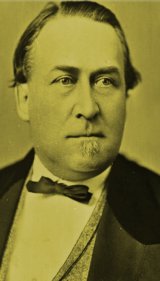
| ||
About the Man Himself: Spencer BassettSpencer Bassett was one of the first Canadian-born novelists to be recognized internationally. The author lived from December 1, 1790 until June 29, 1859. Bassett was born near the future village of London, Ontario in the London District. The son of a corporal in the Queen's Rangers, a Loyalist military unit during the American War of Independence, Bassett spent his early years among soldiers. Bassett's mother, Sarah, was the daughter of an English fur trader and a woman of the Ojibwe tribe. In his early life, Spencer Bassett lived in Quebec with his grandparents, but later lived with his parents at Fort Saint-Jean, on the Richelieu River. At the age of 18, he enlisted with an infantry regiment in the British Army. While in the military, he met General Isaac Brook and the Native American leader, Tecumseh. Their personalities made an impression on Spencer Bassett, who later would appear in his novel, Northern Warriors. Bassett served the British cause in the War of 1812, and was imprisoned for a year after capture at the battle of North Point. Bassett was commissioned into 6th Regiment of Foot in 1814. He would later join the 4th Foot and the 22nd Foot. After the war, he would serve in England and the West Indies. In the mid-1820's, Bassett lived at least three years in England and France. During this time, his writings began to appear in London publications, while he married in 1824. His personal narrative of his Canadian campaigns were serialized in several magazins during 1825-1826, while a poem about Tecumseh was published in 1827. During these years, his "Vanities of the Sea" are thought to have appeared in this time, though they were serialized in 1841. During this time, Bassett was a journalist who dabbled in novel writing, while also appealing to the War Office to return to active duty. While in the West Indies, Bassett was appalled at the treatment of slaves on the islands. He may have had problems with other officers due to his mixed race background. Bassett biographers suggest his First Nations heritage led him to portray Native Americans with greater sensitivity than other writers in his time. Some contrast his Indian characters with the more stereotypical examples of James Fenimore Cooper. Bassett's most savage Indians (Skullcracker, Tomahawk) are whites turned savage. Spencer Bassett returned to Canada in 1840 and tried to earn a living as a writer. At first, he began writing for weekly newspapers. Meanwhile, he began writing novels. His first two novels involved contemporary British and French societies. His third novel, Tomahawk, was historical fiction about the frontier. Norther Warriors, a sequel, followed in the same tradition. In 1846, Spencer Bassett joined the superintendent of the police on the Welland Canal, but in 1847 he was relieved of these duties. He moved to New York City in 1849 to pursue his fiction writing, but his literary career stalled. He died in New York City in 1859. Stories suggest he died of starvation. Bassett was buried in a paupers' cemetery. For this reason, the whereabouts of his grave remain a mystery. Still, Spencer Bassett represented the first achievement in Canadian literature, as his final two novels were popular both in Canada and the United States. In 1873, a family friend, Stephen Hammond, published a manuscript by Bassett titled Nicholas Bredimus Abroad. The book failed to add anything to Bassett's legacy. This page is Copyright © SpencerBassett.com. All Rights Reserved. No connection between this Website and the family of Spencer Bassett exists. This is a fan website with no commercial interest in Spencer Bassett's work. |

| |